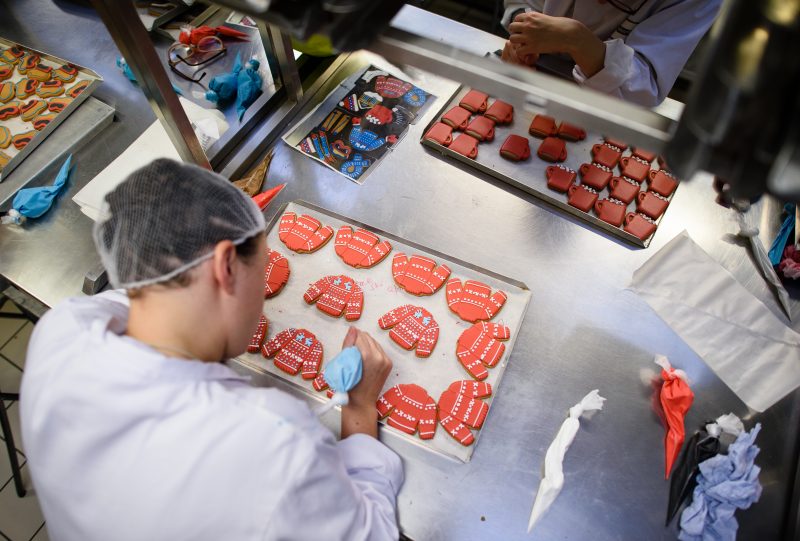Brexit freezing UK food suppliers out of seasonal sales
Fans of a British Christmas risk disappointment this year with Brexit uncertainty putting orders for staples such as chocolates and mince pies in doubt (Leon NEAL)
London (AFP) – Global fans of a traditional British Christmas could be in for a disappointment when the season comes around this year.
Brexit uncertainty is putting orders for staples such as Cadbury chocolates and British mince pies in doubt.
“People in the trade know that deals for Christmas are made quite early in the year,” UK Food and Drink Exporters Association director Sandra Sullivan said on the sidelines of a big annual food fair in London.
“Companies that manufacture confectionery items would normally by now have placed orders for Christmas with some of their international buyers, and those are being delayed for as long as they possibly can,” she told AFP.
“Someone is going to have to take a hit” if the uncertainty persists, she said.
Just 10 days remain before Britain is due to leave the European Union and neither side is the wiser about how and when the split will come about.
With the UK parliament still refusing to approve the Brussels divorce deal, the government is asking EU leaders for a delay and politicians are at each others’ throats.
The unrelenting chaos and unpredictability of the historic occasion leave Wilma Van Grinsven-Padberg distinctly unimpressed.
The Dutch olive oil sommelier comes to England to sniff out the best chutney for her gourmet food supply store in the town of Oosterhout.
“The British people are one of the chutney makers and we buy it, we bring it to The Netherlands, and then we ship it to 12 countries in the world,” Grinsven-Padberg said.
“If the supplier is not ready to export to us, that gives us problems.”
– Jam jar labels –
The food and drinks business is Britain’s largest and one of the most sensitive to how Brexit is resolved.
Government data show the entire agriculture and food sector employing four million people and accounting for 6.4 percent of Britain’s economy.
But record exports of £20 billion ($26.6 billion, 23.4 billion euros) in 2016 are in danger of slowing.
Companies still do not know what labelling laws to follow or which paperwork might be required to complete international declaration forms.
Will Britain still be an EU member in July or December?
Will British jam become more expensive in Europe because it is subject to import tariffs?
Will UK food labels have to follow EU or third-country rules?
These questions must be answered quickly or Britain loses out on the make-or-break holiday shopping season.
Analysts estimate that small and mid-sized firms make between 20 and 40 percent of their sales in the final two months of the year.
And those contracts are being signed now as stores the world over make sure they are fully ready for the holiday rush.
“Christmas would be confectionery, biscuits, gift items,” said Sullivan. “UK manufacturers want to get the pricing right.”
– Land of opportunities –
Consumers will also inevitably be affected.
UK Food and Drink Federation chief Ian Wright said Britons spend less of their household incomes on food than any other Europeans.
That may be about to change.
“The low price of food we have at the moment may not be sustainable in the post-Brexit world at the same level of choice,” Wright cautioned.
Almost any form of Brexit — by definition — is accompanied by new trade rules that come with their own sets of quotas and taxes.
Cans of Portugese sardines and boxes of Italian gnocchi will become more expensive.
Britons will have to buy a smaller range of local products if they want to spend less.
“Consumers and shoppers are going to have to make that choice,” Wright said.
Yet not everyone is downbeat about the business.
Paul Hargreaves said his Cotswold Fayre fine foods wholesaler trades mostly in UK products and has benefited from the slide in the pound’s value that Brexit caused in 2016.
His goods are cheaper for foreigners to import.
“It seems for us, the closer we get to Brexit, potentially the better we are doing,” Hargreaves told AFP.
“Stop looking at the doom and gloom and start looking for the opportunities,” he said.
Disclaimer: This story is published from a syndicated feed. Siliconeer does not assume any liability for the above story. Validity of the above story is for 7 Days from original date of publishing. Content copyright AFP.


